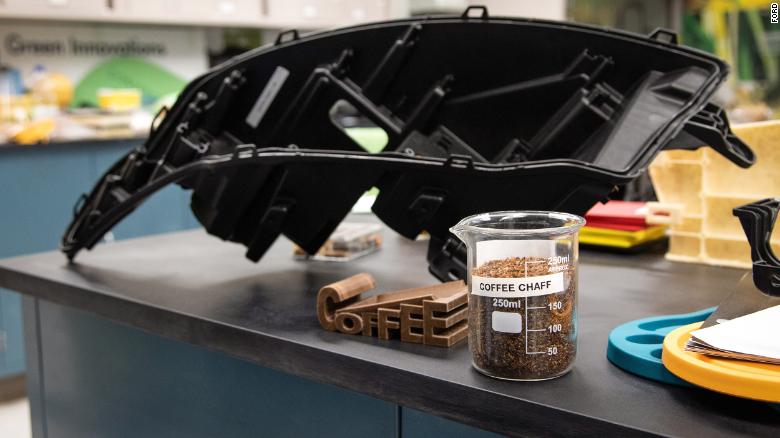–
New York (CNN Business) Ford has tapped McDonald’s to help it turn coffee parts into car parts.
Starting this year, Ford is incorporating coffee chaff — coffee bean skin that comes off during the roasting process — into the plastic headlamp housing used in some cars. It’s asked McDonald’s, which doesn’t roast its own coffee, to connect it with suppliers.
In recent years, as consumers become more concerned about plastic pollution and carbon emissions, companies have made sweeping commitments to reduce their impacts on the environment. They’ve also been developing innovative, sustainable materials to build consumer products.
–
Ford is using coffee chaff to help reduce its environmental impact.
–
Traditionally, Ford uses plastic and talc to make its headlamp housing, explained Debbie Miewelski, senior technical leader of materials sustainability for Ford. The coffee version is more sustainable because it’s lighter and doesn’t use the talc which, as a mineral, isn’t renewable.
Traditionally, Ford uses plastic and talc to make its headlamp housing, explained Debbie Miewelski, senior technical leader of materials sustainability for Ford. The coffee version is more sustainable because it’s lighter and doesn’t use the talc which, as a mineral, isn’t renewable.
–
Coffee chaff, on the other hand, is widely available, Miewelski said, and much of it goes to waste. Eventually, Ford hopes to incorporate the material into more cars and use it for more parts.
–
Ford decided to work with coffee chaff a few years ago. But it’s been experimenting with organic materials for over a decade.
–
The auto company has been using soy-based foam in its cushions since 2011. It also uses waste from wheat, coconut, tomato and other plants in its cars in order to help meet some of its sustainability goals, which include using more renewable materials.
–
–
–
“If you came to our lab, it looks somewhere between a landfill and a farm,” Miewelski said. Her team decided to examine the potential of coffee because the beverage is so ubiquitous.
–
Once the Ford team figured out how coffee chaff could be used to build car parts, it reached out to McDonald’s because of the restaurant chain’s scale and its comparable sustainability goals, Miewelski said. Like Ford, McDonald’s also wants to incorporate renewable and recycled materials into its products.
–
The partnership between Ford (F) and McDonald’s (MCD) is an example of how brands with distinct sustainability initiatives can work together.
McDonald’s recently achieved its goal of sourcing all of its US coffee sustainably, one year ahead of schedule, and is also working with competitors to develop more environmentally friendly coffee cups.
–
When Ford approached it about the coffee chaff product a few years ago, the company was able to consider another way to make its coffee greener, said Ian Olson, senior director of global sustainability at McDonald’s.
–
“We’ve conventionally thought of collaborations as within the food industry,” Olson said. The Ford partnership can help McDonald’s see “what kind of larger impacts are possible,” when it works with a company in another sector.
–
“This is just scratching the surface of trying to understand what’s possible,” Olson said.
–
–
(For the source of this, and many other equally interesting articles, please visit: https://www.cnn.com/2019/12/04/business/ford-mcdonalds-coffee-chaff/index.html)











